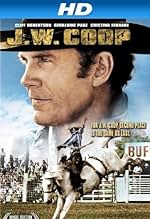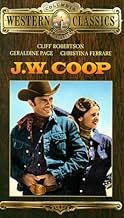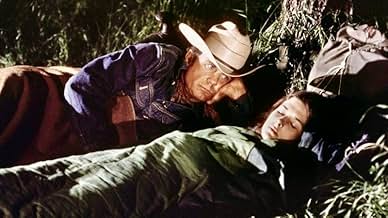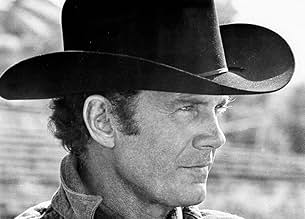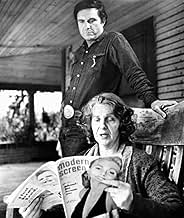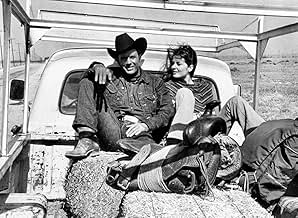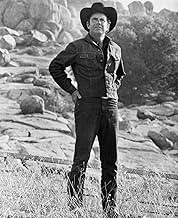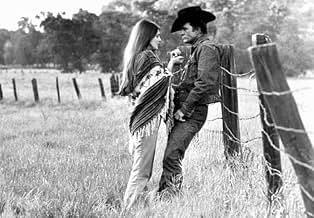Tras pasar casi 10 años en prisión, el vaquero J. W. Coop regresa al rodeo profesional en los 60. Decidido a recuperar el tiempo perdido, descubre que tanto el negocio del rodeo como la soci... Leer todoTras pasar casi 10 años en prisión, el vaquero J. W. Coop regresa al rodeo profesional en los 60. Decidido a recuperar el tiempo perdido, descubre que tanto el negocio del rodeo como la sociedad han cambiado drásticamente.Tras pasar casi 10 años en prisión, el vaquero J. W. Coop regresa al rodeo profesional en los 60. Decidido a recuperar el tiempo perdido, descubre que tanto el negocio del rodeo como la sociedad han cambiado drásticamente.
- Dirección
- Guionistas
- Elenco
Marjorie Durant
- Big Marge
- (as Marjorie Durant Dye)
Mary-Robin Redd
- Bonnie May
- (as Mary Robin Redd)
- Dirección
- Guionistas
- Todo el elenco y el equipo
- Producción, taquilla y más en IMDbPro
Opiniones destacadas
10saebjorn
This hard to get, modern western is definitely one of the best film by Mr. Robertson, a fine, underrated actor and director. J.W. Coop, gives a realistic and honest view of a lonesome, luckless but brave man, an ex-con who tries and fails in the rodeo world and is also an underdog in life. Simple, brilliant story with Robertson's flawless acting matched by the late, grand Geraldine Page (as his mom). A fine cameo by the great character actor, R.G. Armstrong, and for the eye, there's the beautiful Cristina Ferrare who disappeared from films to marry Mr. John DeLorean (if somebody remembers the car in Back to the Future films.) So, catch it if you can!
just reading the blurb and knowing that Cliff Robertson was a part of the film was enough for me to know that this was going to be a gem [although Robertson has made some horrible movies]. I got a pal of mine at work to run me a copy [grainy], and it surpassed my expectations. This film increased my resolve to attend rodeo school. Because it was something I always wanted and at forty-one years of age and never having ridden a horse I gave my wife and daughter a kiss and piled in my car for Georgia and the time of my life. Why rodeo? In the words of the author of RODEO: the Suicide Circuit, because it is the last place in these hard times where a man with nothing can meet it head on on his own *#*# terms and maybe do something. JW Coop conveys this perfectly. But this movie is not simply about rodeo. Like the film, the SAND PEBBLES, a man is trying to translate his existence into something meaningful. It is about a nobody going after the only thing in his life that makes sense. Just writing about it gets my blood up.
Some would disagree with the ending, but I can see it no other way. If you want to see a movie about a man going after life this is one film sure to satisfy. I give JW COOP a three star [out of four] and it stands as one of my favorites.
Some would disagree with the ending, but I can see it no other way. If you want to see a movie about a man going after life this is one film sure to satisfy. I give JW COOP a three star [out of four] and it stands as one of my favorites.
Actor Cliff Robertson’s clout after his Oscar win in CHARLY (1968) allowed this personal venture which he wrote, produced and directed as well as starred in; the film, though much admired in some circles and certainly well-made, is essentially dreary and somewhat overlong for its purpose. Incidentally, rodeo is not a subject which has been treated often by Hollywood: a couple more notable efforts were Nicholas Ray’s rare but highly regarded THE LUSTY MEN (1952) – which I recently acquired but have yet to watch – and Sam Peckinpah’s contemporaneous and better-known JUNIOR BONNER (1972).
Anyway, the titular figure is an enthusiast of the sport who wants to pick up where he left off following a 10-year stint in jail for fraud; after a pathetic reunion with his senile mother (a cameo, despite her second billing, by a disheveled Geraldine Page), he sets off to seek a prominent spot in the National Finals. This entails a series of contests across the country – he starts off by hitching rides to each destination, then borrows a van (through a friend) from a military base but, after scoring a number of successes and winning a pile of money, he can afford to fly the rest of the way.
Robertson meets spirited young hippie Cristina Ferrare; following the initial distrust (being a middle-aged uneducated cowboy himself, they have virtually nothing in common), he comes to appreciate her devoted presence by his side – however, when he finally proposes marriage, she quits him. Coop’s biggest rival is a brash stud half his age whose wealth is able to keep him well ahead of the game (getting to the various rodeo venues by way of a private plane). Still, our hero perseveres – but his dream seems to come to an end when he breaks a leg; undaunted, he decides to mount a particularly wild bull…but his triumph this time around is short-lived and he’s gored by the testy animal!
Robertson elicits fine performances all around and shows great feeling for small-town America – as well as passion for his central theme (which isn’t so much about achieving one’s goals no matter what, as how this often rings hollow when all one has to show for it is loneliness). A nice folksy score supplies the perfect accompaniment to the film’s attractive photography – offsetting the generally downbeat tone and the occasional instance of self-conscious direction (such as the use of abrupt zooms or Coop’s slow-motion last ride). Equally agreeable are its sparse moments of humor – namely the cowboy’s ironic home address, 1313 Luck Road, requested by an apologetic cop when he’s forced to give him a ticket (Coop’s driving his late father’s ‘smoking’ broken-down car) and the incident in the diner’s lavatory where rednecks attack the hero’s black pal but, even outnumbered, they beat up their assailants and, when the cops arrive, Robertson justifies the mess by claiming the locals had been making “weird advances”!
Anyway, the titular figure is an enthusiast of the sport who wants to pick up where he left off following a 10-year stint in jail for fraud; after a pathetic reunion with his senile mother (a cameo, despite her second billing, by a disheveled Geraldine Page), he sets off to seek a prominent spot in the National Finals. This entails a series of contests across the country – he starts off by hitching rides to each destination, then borrows a van (through a friend) from a military base but, after scoring a number of successes and winning a pile of money, he can afford to fly the rest of the way.
Robertson meets spirited young hippie Cristina Ferrare; following the initial distrust (being a middle-aged uneducated cowboy himself, they have virtually nothing in common), he comes to appreciate her devoted presence by his side – however, when he finally proposes marriage, she quits him. Coop’s biggest rival is a brash stud half his age whose wealth is able to keep him well ahead of the game (getting to the various rodeo venues by way of a private plane). Still, our hero perseveres – but his dream seems to come to an end when he breaks a leg; undaunted, he decides to mount a particularly wild bull…but his triumph this time around is short-lived and he’s gored by the testy animal!
Robertson elicits fine performances all around and shows great feeling for small-town America – as well as passion for his central theme (which isn’t so much about achieving one’s goals no matter what, as how this often rings hollow when all one has to show for it is loneliness). A nice folksy score supplies the perfect accompaniment to the film’s attractive photography – offsetting the generally downbeat tone and the occasional instance of self-conscious direction (such as the use of abrupt zooms or Coop’s slow-motion last ride). Equally agreeable are its sparse moments of humor – namely the cowboy’s ironic home address, 1313 Luck Road, requested by an apologetic cop when he’s forced to give him a ticket (Coop’s driving his late father’s ‘smoking’ broken-down car) and the incident in the diner’s lavatory where rednecks attack the hero’s black pal but, even outnumbered, they beat up their assailants and, when the cops arrive, Robertson justifies the mess by claiming the locals had been making “weird advances”!
Cliff Robertson co-wrote, co-produced, directed and stars in this unassuming rodeo drama-cum-character study, a movie he personally financed for distribution through Columbia Pictures by keeping costs down and paying most of his actors scale. It's a handsome, occasionally laconic piece of work, crisp and not dawdling, helped immeasurably by Frank Stanley's sometimes good-sometimes brilliant cinematography. The star of a Texas prison rodeo, having just served 10 years in the jug for writing bad checks, is paroled and hits the rodeo circuit, where he works his way up to second-best cowboy (just behind an airplane-chauffeured hotshot who barely has to break a sweat to be number one). Robertson directs himself very well--it is one of his finest performances--though the same can't be said for many of the supporting players, many of whom are real-life rodeo performers portraying themselves. An air of detached amateurism coats the project, with much of the background and sideline action coming off as needless, over-the-top, or just plain sloppy. Still, when Robertson zeros in on a sequence--such as a rough fist-fight in a men's washroom or an idyllic getaway for Coop and his hippie girlfriend--the results can be stunningly effective. Robertson is contemplative and unafraid to allow curious scenes to run their course; Geraldine Page, as Coop's mother, has just one long sequence that doesn't appear to do much for the picture, yet Robertson finds the rhythm in the dialogue and eventually gets to the meditative payoff. I'm not quite sure what the final scene is meant to say, except that "a loner is a lonely man"...still, the artiness which underlines the film's climax is a bit alienating. It doesn't make for a big night at the movies. ** from ****
Growing up in the Mid_West, the concept of `art' film was quite foreign to me in 1971. The first time I saw J.W. Coop, it struck me like a thunderbolt. Lots of ambin' around, reaction shots, quiet confidence, pseudo-documentary style, unspoken sub text
WOW.
A labor love for Cliff Robertson, JW COOP is an indie-like movie developed in the 1970's studio system, where titles like POSEIDON ADVENTURE and TOWERING INFERNO were the only things that made sense at the time.
As a result, studio-type compromises are evident throughout--Christina Ferrare is atrocious as the hippie-chick who interjects JW's dust covered mind-set to the present. I'm certain the original script-by Gary Cartwright and the ingenious Bud Shrake was likely funnier and edgier.
What's left is still engaging, and the rest of the supporting cast is solid, the story interesting--spiced with wonderful little vignettes throughout. I highly recommend.
A labor love for Cliff Robertson, JW COOP is an indie-like movie developed in the 1970's studio system, where titles like POSEIDON ADVENTURE and TOWERING INFERNO were the only things that made sense at the time.
As a result, studio-type compromises are evident throughout--Christina Ferrare is atrocious as the hippie-chick who interjects JW's dust covered mind-set to the present. I'm certain the original script-by Gary Cartwright and the ingenious Bud Shrake was likely funnier and edgier.
What's left is still engaging, and the rest of the supporting cast is solid, the story interesting--spiced with wonderful little vignettes throughout. I highly recommend.
¿Sabías que…?
- TriviaDuring the National Finals Rodeo sequence when the rodeo announcer is talking, the man with a cowboy hat and blue sport coat on and a blue scarf tie is Clem McSpadden. He was a nephew of Will Rogers and was a longtime Oklahoma State Senator. He was from Claremore, as was Will Rogers. He was also a famed rodeo announcer professionally.
- ErroresWhen JW is sitting on a bull, he is introduced to "Hot Pistol" whomever, and Larry Mahan; he asks for tips on riding the bull, and is told something about "marking him out"; there is no mark out rule in bull riding.
- ConexionesReferenced in 'Obsession' Revisited (2001)
Selecciones populares
Inicia sesión para calificar y agrega a la lista de videos para obtener recomendaciones personalizadas
- How long is J W Coop?Con tecnología de Alexa
Detalles
- Fecha de lanzamiento
- País de origen
- Idioma
- También se conoce como
- J.W. Coop
- Locaciones de filmación
- McAlester, Oklahoma, Estados Unidos(uncredited McAlester, Oklahoma)
- Productoras
- Ver más créditos de la compañía en IMDbPro
Contribuir a esta página
Sugiere una edición o agrega el contenido que falta


